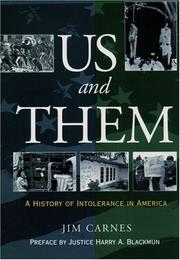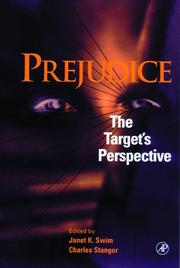| Listing 1 - 10 of 51 | << page >> |
Sort by
|
Book
ISBN: 1536101761 9781536101768 9781536101676 1536101672 Year: 2016 Publisher: New York
Abstract | Keywords | Export | Availability | Bookmark
 Loading...
Loading...Choose an application
- Reference Manager
- EndNote
- RefWorks (Direct export to RefWorks)
Prejudices. --- Bias (Psychology) --- Prejudgments --- Prejudice --- Prejudices and antipathies --- Attitude (Psychology) --- Emotions
Book
ISBN: 9789353283162 9353283167 9789353283155 9353283159 9789353283148 9353283140 9353881706 Year: 2019 Publisher: New Delhi : SAGE Publications,
Abstract | Keywords | Export | Availability | Bookmark
 Loading...
Loading...Choose an application
- Reference Manager
- EndNote
- RefWorks (Direct export to RefWorks)
Violence --- Prejudices. --- Bias (Psychology) --- Prejudgments --- Prejudice --- Prejudices and antipathies --- Attitude (Psychology) --- Emotions
Book
ISBN: 9781620816219 1620816210 9781620816066 1620816067 Year: 2012 Publisher: New York
Abstract | Keywords | Export | Availability | Bookmark
 Loading...
Loading...Choose an application
- Reference Manager
- EndNote
- RefWorks (Direct export to RefWorks)
Prejudices. --- Bias (Psychology) --- Prejudgments --- Prejudice --- Prejudices and antipathies --- Attitude (Psychology) --- Emotions
Book
ISBN: 0367102609 0429475586 1782412573 9781782412571 9781782201113 1782201114 042990035X 042991458X Year: 2015 Publisher: London
Abstract | Keywords | Export | Availability | Bookmark
 Loading...
Loading...Choose an application
- Reference Manager
- EndNote
- RefWorks (Direct export to RefWorks)
Hostile and Malignant Prejudice: Psychoanalytic Approaches represents the leading edge of work in the field of prejudice by members of the International Psychoanalytical Association's Committee on Prejudice (including snti-semitism), psychoanalysts who hail from Belgium, Brazil, Canada, Germany, Peru, Sweden, the United States, and Uruguay. It pursues the issues surrounding hostile and malignant prejudice as defined in the first chapter by Henri Parens, whose path-breaking work over four generations with children and their mothers uncovered the sources of aggression and prejudice on a scale from jocular slurs to murderous genocide. One chapter examines the effects of Latin America's colonial past on the psychic development of a mixed race young man whose analysis implicates a major racial and social divide in the heart of his society. In another chapter we learn of the identity conflicts of children who were separated from their parents during the Holocaust and hidden or hidden in plain sight by adopting a Christian persona. Other chapters examine the philosophical implications of the psychoanalytic approaches to hostile and malignant prejudice in human history, and the application of psychoanalysis to international relations. The various chapters and approaches of the book take psychoanalysis to the borderline areas of anthropology, philosophy, politics, and sociology to illuminate and offer ways to understand and treat in a practical way one of the greatest scourges in human history.
Hostility (Psychology) --- Prejudices. --- Bias (Psychology) --- Prejudgments --- Prejudice --- Prejudices and antipathies --- Attitude (Psychology) --- Emotions --- Enmity --- Hostile behavior --- Psychology --- Enemies
Book
ISBN: 9781622573769 1622573765 9781622573240 1622573242 1622573765 Year: 2012 Publisher: Hauppauge, N.Y.
Abstract | Keywords | Export | Availability | Bookmark
 Loading...
Loading...Choose an application
- Reference Manager
- EndNote
- RefWorks (Direct export to RefWorks)
Prejudices. --- Discrimination --- Bias --- Interpersonal relations --- Minorities --- Toleration --- Bias (Psychology) --- Prejudgments --- Prejudice --- Prejudices and antipathies --- Attitude (Psychology) --- Emotions --- Psychological aspects.
Book
ISBN: 9780521878357 0521878357 9780521702591 0521702593 9780511802560 9780511691478 0511691475 1107210895 9781107210899 0511849753 9780511849756 1282653377 9781282653375 9786612653377 661265337X 0511802560 0511689993 9780511689994 0511692595 9780511692598 0511690738 9780511690730 051168925X Year: 2010 Publisher: Cambridge, UK New York Cambridge University Press
Abstract | Keywords | Export | Availability | Bookmark
 Loading...
Loading...Choose an application
- Reference Manager
- EndNote
- RefWorks (Direct export to RefWorks)
"While overt prejudice is now much less prevalent than in decades past, subtle prejudice - prejudice that is inconspicuous, indirect, and often unconscious - continues to pervade. Laws do not protect against subtle prejudice and, because of its covert nature, it is difficult to observe and frequently goes undetected by both perpetrator and victim. Benign Bigotry uses a fresh, original format to examine subtle prejudice by addressing six commonly held cultural myths based on assumptions that appear harmless but actually foster discrimination: 'those people all look alike'; 'they must be guilty of something'; 'feminists are man-haters'; 'gays flaunt their sexuality'; 'I'm not a racist, I'm color-blind' and 'affirmative action is reverse racism'. Kristin J. Anderson skillfully relates each of these myths to real world events, emphasizes how errors in individual thinking can affect society at large, and suggests strategies for reducing prejudice in daily life"--Provided by publisher.
Prejudices. --- Toleration. --- Discrimination. --- Préjugés --- Préjugés --- Prejudices --- Toleration --- Discrimination --- Bigotry --- Intolerance --- Tolerance --- Virtues --- Bias (Psychology) --- Prejudgments --- Prejudice --- Prejudices and antipathies --- Attitude (Psychology) --- Emotions --- Health Sciences --- Psychiatry & Psychology

ISBN: 1280603178 0199761221 1423774655 9780199761227 0195131258 0195103785 9780195103786 9780195131253 9786610603176 6610603170 Year: 1996 Publisher: New York Oxford University Press
Abstract | Keywords | Export | Availability | Bookmark
 Loading...
Loading...Choose an application
- Reference Manager
- EndNote
- RefWorks (Direct export to RefWorks)
Prejudices --- Fanaticism --- Intolerance --- Zealotry --- Enthusiasm --- Bias (Psychology) --- Prejudgments --- Prejudice --- Prejudices and antipathies --- Attitude (Psychology) --- Emotions --- History. --- United States --- Race relations. --- Race question

ISBN: 1281046949 9786611046941 0080539440 9780080539447 0126791309 9780126791303 Year: 1998 Publisher: San Diego : Academic Press,
Abstract | Keywords | Export | Availability | Bookmark
 Loading...
Loading...Choose an application
- Reference Manager
- EndNote
- RefWorks (Direct export to RefWorks)
This book turns the tables on the way prejudice has been looked at in the past. Almost all of the current information on prejudice focuses on the person holding prejudiced beliefs. This book, however, provides the first summary of research focusing on the intended victims of prejudice. Divided into three sections, the first part discusses how people identify prejudice, what types of prejudice they encounter, and how people react to this prejudice in interpersonal and intergroup settings. The second section discusses the effect of prejudice on task performance, assessment of ones own abilities,
Prejudices. --- Stereotypes (Social psychology) --- Mental stereotypes --- Stereotype (Psychology) --- Stereotyping (Social psychology) --- Social psychology --- Attitude (Psychology) --- Rigidity (Psychology) --- Bias (Psychology) --- Prejudgments --- Prejudice --- Prejudices and antipathies --- Emotions

ISBN: 1281147044 9786611147044 0191518158 1435609484 9780191518157 9781281147042 6611147047 0192892770 9780192892775 9781435609488 9780192892775 Year: 2007 Publisher: Oxford New York
Abstract | Keywords | Export | Availability | Bookmark
 Loading...
Loading...Choose an application
- Reference Manager
- EndNote
- RefWorks (Direct export to RefWorks)
Antisemitism has been a chillingly persistent presence throughout the last millennium, culminating in the dark apogee of the Holocaust. Steven Beller examines and untangles the history of the phenomenon: from medieval religious conflict, to its growth as a political and ideological movement in the 19th century, and 'new' antisemitism today. - ;This Very Short Introduction examines and untangles the various strands of antisemitism seen throughout history, from medieval religious conflict to 'new' antisemitism in the 21st century. Steven Beller reveals how the phenomenon grew as a political and
Antisemitism. --- Prejudices. --- Bias (Psychology) --- Prejudgments --- Prejudice --- Prejudices and antipathies --- Attitude (Psychology) --- Emotions --- Anti-Jewish attitudes --- Anti-Semitism --- Ethnic relations --- Prejudices --- Philosemitism --- Antisemitism --- 296.2 --- 296.2 Antisemitisme --- Antisemitisme
Book
ISBN: 0300163738 9780300163735 9780300162516 0300162510 Year: 2014 Publisher: New Haven
Abstract | Keywords | Export | Availability | Bookmark
 Loading...
Loading...Choose an application
- Reference Manager
- EndNote
- RefWorks (Direct export to RefWorks)
Stephen Eric Bronner is a prolific author, activist, and one of America's leading political thinkers. His new book presents bigotry as a systematic, all-encompassing mindset that has a special affinity for right-wing movements. In what will surely prove a seminal study, Bronner explores its appeal, the self-image it justifies, the interests it serves, and its complex connection with modernity. He reveals how prejudice shapes the conspiratorial and paranoid worldview of the true believer, the elitist, and the chauvinist. In the process, it becomes apparent how the bigot hides behind mainstream conservative labels in order to support policies designed to disadvantage the targets of his contempt. Examining bigotry in its various dimensions-anthropological, historical, psychological, sociological, and political-Professor Bronner illustrates how the bigot's intense hatred of "the other" is a direct reaction to social progress, liberal values, secularism, and an increasingly complex and diverse world. A sobering look at the bigot in the twenty-first century, this volume is essential for making sense of the dangers facing democracy now and in the future.
Prejudices. --- Toleration. --- Political science --- Political philosophy --- Bigotry --- Intolerance --- Tolerance --- Virtues --- Discrimination --- Bias (Psychology) --- Prejudgments --- Prejudice --- Prejudices and antipathies --- Attitude (Psychology) --- Emotions --- Philosophy. --- Prejudices.. --- Toleration.. --- Political science -- Philosophy.
| Listing 1 - 10 of 51 | << page >> |
Sort by
|

 Search
Search Feedback
Feedback About UniCat
About UniCat  Help
Help News
News